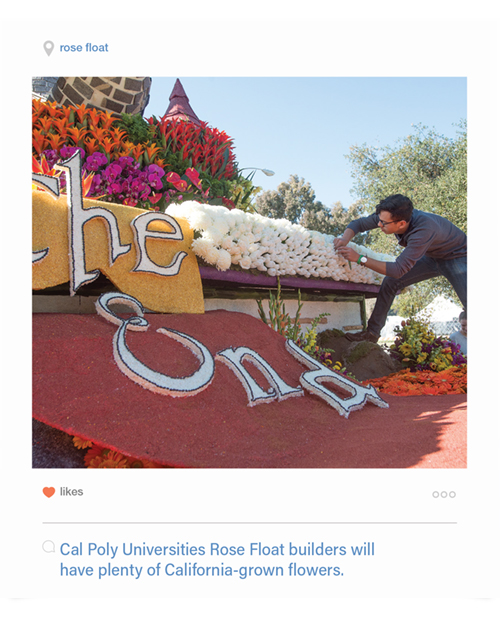Highlights

Cal Poly Pomona Earns High Marks on ‘Best Colleges’ ListCal Poly Pomona continues to be rated among the top colleges and universities in the Western United States, according to U.S. News & World Report’s “Best Colleges 2016.” The university came in fourth among non-doctorate-granting public universities in the West, and was ranked second among CSU campuses. “These rankings recognize our outstanding programs and our hands-on education. That’s why employers value a Cal Poly Pomona degree – it means that our graduates can make significant contributions on day one,” says University President Soraya M. Coley. “We are proud to have achieved this level of success while creating access and opportunities for students from all backgrounds.” When private institutions are included, Cal Poly Pomona also stacks up strongly, ranking No. 31 in the West. Read more about the ranking on PolyCentric. |
University Excels in White House’s College ScorecardAffirming the reputation of Cal Poly Pomona, the White House’s revamped College Scorecard highlights the university’s affordable tuition and a graduation rate that surpasses the national average. The average annual cost to attend Cal Poly Pomona is $12,135. That figure is nearly 28 percent less than the national average of $16,789 for other four-year public universities. Cal Poly Pomona’s College Scoreboard profile shows a six-year graduation rate of 52 percent, which is better than the national average (44 percent). In regard to retention, 90 percent of Cal Poly Pomona students return to the university after their first year; the national average is 67 percent. The College Scoreboard includes students’ earnings after college and data on students repaying loans. Ten years after graduating, Cal Poly Pomona alumni earn a median of $52,000 annually, much greater than the national figure of $34,343. The College Scorecard is designed to increase transparency, putting information in the hands of the public to see how well colleges and universities are serving their students. Learn more about the White House Scorecard. |
First Elder/Scholar-in-Residence Takes PostLorene Sisquoc (Mountain Cahuilla/Apache) is the first elder/scholar in-residence in the history of the university. She was born in Riverside and brings a wealth of knowledge about Native American traditions, basketry, and native plants and their uses. She was invited to the campus through programs such as the Native American Pipeline and Pathways to Graduation program, which was funded by a $150,000 gift from alumnus Don Huntley three years ago. Sisquoc is a member of the Fort Sill Apache Tribe and a descendant of the Mountain Cahuilla of Southern California. She also is a direct descendant of Mangas Coloradas, the last chief of the Mimbreno Apaches, Chief Loco of the Warm Springs Apaches and Manuel Largo, a leader of the Mountain Cahuilla. As a traditional artist and presenter, she is dedicated to the preservation of Native American culture. She also strives to ensure that American Indian history is accurately depicted and that future generations are offered the opportunity to carry on revered traditions. |
|
Campus Brewery Offers ClassesThe College of the Extended University is scheduling two classes in brewing science: The culture of micro-brewery and handcraft beers and all-grain basics. The culture of micro-brewery and handcraft beers will examine the history of beer as an American tradition. The course also will offer an in-depth look at the legacy of beer, brewing and the re-emergence of handcraft brews as an art and science. Students will learn to pair beer with food and the art of tasting and appreciation. All-grain basics will look at the science and art of brewing ales and lagers. Learn more about Innovation Brew Works on PolyCentric. |
Transition to Unified Library Management System BeginsThe California State University system is adopting a next-generation online library services platform that will connect all 23 CSU libraries. Called the Unified Library Management System, it will be provided by ExLibris and take place in phases over the next two years. The move to a unified system will reduce costs by enabling a variety of collaborative efforts throughout the CSU. These include building collections and creating services that will enhance teaching, learning and research. The system is being implemented and will be launched at all CSU campuses in May 2017. |
Course Promotes Data Resource Skills at University LibraryThe University Library has introduced LIB 150, a course to promote information literacy. The course will help students determine when, why and what information is needed, and then find, evaluate, and use that information effectively and ethically to solve problems, make decisions, and communicate with others. During the course, students will choose a topic of interest and research it throughout the quarter. While researching their topic, they will learn how to evaluate, manage, filter, use and cite information effectively and ethically. Students will also examine their own media consumption habits and how it impacts their behavior, attitudes and perspectives. Other topics that will be discussed are the dissemination, consumption and (mis) uses of information, digital activism, social media and crowd-sourcing. |

 Rose Float Secures Pact for Flowers
Rose Float Secures Pact for Flowers